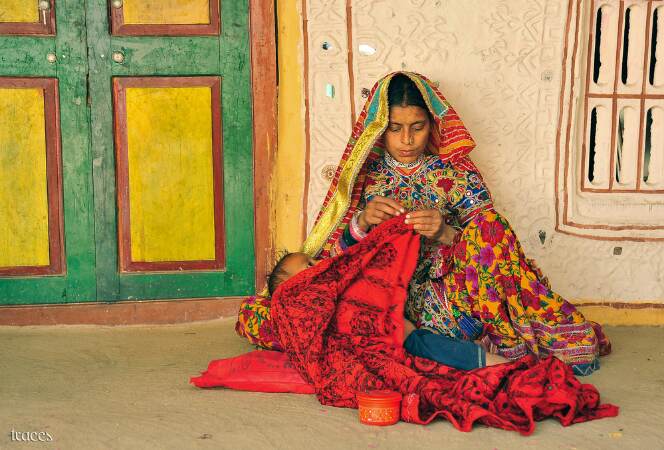Nexus of Good: Skilled Samaritan Foundation
The mission is to upskill craftswomen from marginalised communities and make them micro-entrepreneurs

India has over seven million artisans — unofficial figures even peg the number at nearly 200 million. 85 per cent of artisans across India are reliant on offline markets, and 95 per cent of them faced losses in revenue due to the impact of COVID-19. Many women with basic craft skills have limited or no income opportunities due to lack of novelty in designs and dependency on offline markets along with the norms especially meant for women from marginalized communities that limit them from working outside their homes. There aren't many structured programmes in India for designers where they can leverage the skills of artisans to provide them tech-based design training and market access opportunities to diversify their income opportunities.
Skilled Samaritan Foundation (SSF), a non-profit enterprise, integrates technology and design to empower formally uneducated women from marginalised communities to help them make well-designed functional home and lifestyle products. Through its flagship programmes, the foundation leverages the skill sets of expert product designers through an annual six-month online and offline programme called Skill Lab: Design and Impact Fellowship to provide women clusters having basic craft skills across India, with design skills and crucial digital skills and tools to help them expand their economic opportunity across online and offline platforms.
SSF launched its pilot programme in district Muzaffarnagar, Uttar Pradesh in October 2019 by using digital tools and applications to communicate new designs to artisans so that they could continue working from their homes despite the lockdown. This model helped bring almost 350+ artisans online.
It positively impacted an average of 5.2 of artisans' dependants and family members leading to a ripple impact on almost 3,000 lives and job creation for 1,200 individuals. SSF was successfully able to include these women in the digital economy despite six months of lockdown in 2020, attracting a revenue of almost Rs 90,00,000 for the brand and an average monthly income of Rs 3,750 per active artisan.
The key insight SSF found was that with holistic support, artisans were able to diversify/improve their product range. They could even find diverse market opportunities in such a way as to become micro-entrepreneurs in their own right. Thus, SSF decided to recreate the success story of Muzaffarnagar to other clusters around India and that is when the Skills Lab: A Design and Impact Fellowship was conceptualised.
In The Skills Lab: A Design and Impact Fellowship, from Year 0, 10 designers (fellows) are embedded in five craft clusters across India to provide artisans with holistic support on aspects such as design development, digital tools, and insights on online/offline market linkages. By the end of the programme, artisans will have the necessary tools required to be a part of India's growing digital economy as potential micro-entrepreneurs.
The mission is to upskill women to make not only well-designed products that appeal to online global buyers' sensibilities but also sell these products online themselves. The vision is to create a world where women can use their existing skills in craft to earn dignified incomes and gain financial independence irrespective of their formal education.
The programme is broadly divided into five phases of intervention and training. All artisan-trainings will be facilitated by the design fellows who will be selected through an extensive selection criterion and undergo a rigorous pre-programme bootcamp themselves. At certain stages, they will be collaborating with various tech partners to facilitate training.
1. Pre-programme/Phase 0 (Enrolment): To open bank accounts and issue Aadhar cards for all artisans.
2. Phase 1 (market and design research): Fellows familiarise themselves with the cluster, craft and the artisans to identify potential product ideas, market opportunities and raw material sources.
3. Phase 2 (ideation and conceptualisation): To collaboratively design products suitable for the present-day market, and in the process, train artisans in design development skills.
4. Phase 3 (prototyping and execution): To upgrade artisans' craft skills while prototyping and executing products (including the use of a range of SKUs and raw materials).
5. Phase 4 (pricing and cataloguing): To train artisans on how to use digital tools to capture, digitally store designs for inventory management/bookkeeping and also, pricing products appropriately.
6. Phase 5 (market linkages): To seek online and offline market linkages to sell their products.
Considering the current situation, SSF is working towards connecting with and supporting artisans remotely. It recently conducted a virtual design training for artisans in the village of Bhagwanpur in partnership with the Tara Akshar Programme of Development Alternatives. Artisans from Muzaffarnagar taught these women how to create new products with different weaving patterns from sustainable materials. Although bringing artisans from remote villages to the 'virtual field' may face several challenges including internet access, communication barriers and artisan's lack of digital skills; this is an opportunity to connect artisans and designers spread out across the country (and possibly even the world).
SSF aims to conduct live training sessions and also creates a repository of resources in the form of tutorial videos for artisans (in collaboration with tech partners). These may touch upon a range of topics including how to price products, sourcing sustainable materials, different weaving patterns and much more.
In the next five years, SSF aims to train over 10,000 artisans across the country. The projected impact of this would be support for an average of 5.5 dependents per artisan which means 50,000 plus people will be supported. Further, for every flourishing artisan, 1.5 additional jobs on average are created totalling 10,000 additional jobs in the wider economy.
SSF has done some wonderful work in the true spirit of Nexus of Good. However, the real challenge will come when it scales these operations, which it should, because the true worth of concept gets established only when it gets scaled. In this context, it would be worthwhile considering association with state governments and their agencies as has been successfully demonstrated by many civil society organizations.
Views expressed are personal



